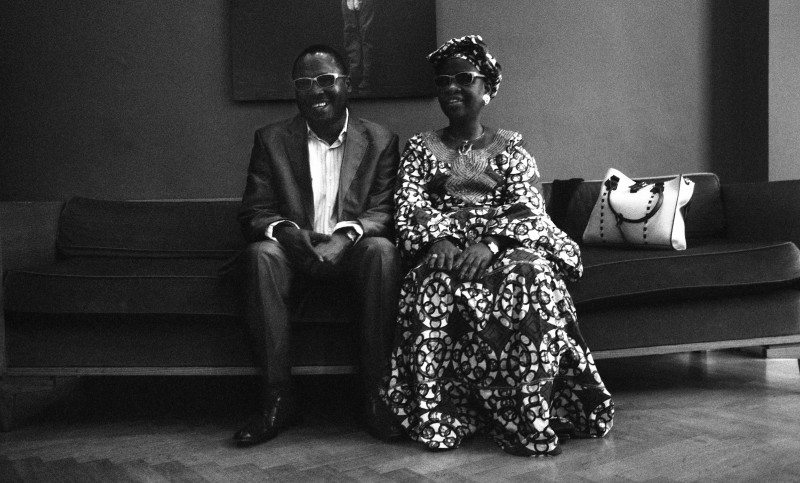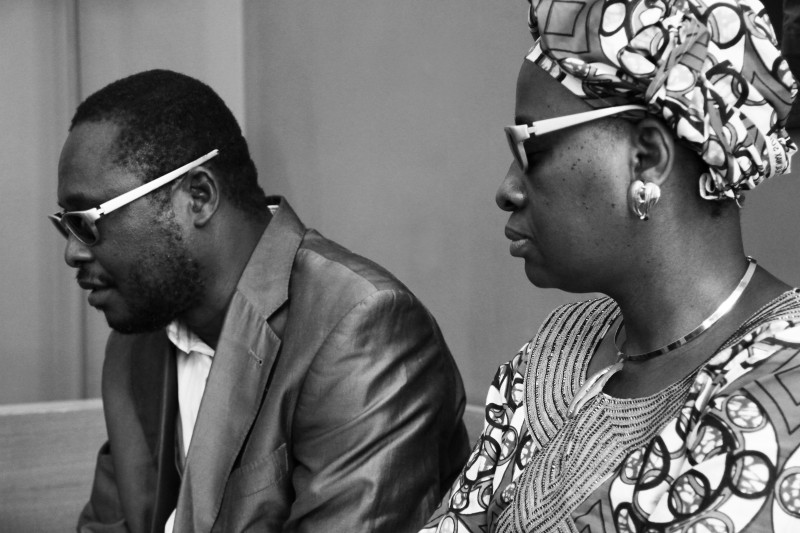Amadou & Mariam – The Blind Couple From Mali
“A story is like a dream. And we can only dream with our eyes closed.” Hamadoun Tandina
Esteemed for showcasing a host of innovative shows, remarkable and peculiar in nature, this summer’s Manchester International Festival stages Eclipse, a sensory production like no other.

The auditorium lights have been extinguished. The night-vision equipped stewards fade out of sight and all is wrapped in dark. You hold a hand up to your face, but see nothing. The audience is attentive and still, inducing a sense of solitude. Amidst the lull, pebbles are being swept, to and fro. One discerns the soothing sound of pacing, someone humming gaily, billowing linen, the crunch of rubble underfoot. The entire hall is surrounded in audio, growing in vivid intensity. Cockerels squawk, donkeys bray, a baby wails, a door is battered against its frame, the muezzin calls the faithful to prayer, a square in Bamako is engulfed by motorcycles.
Following the musical roots of Amadou and Mariam, the audience is transported to their native Mali, transfixed in an almost meditative state. The absence of sight is integral to the experience: heightening our perceptiveness whilst instilling a necessary empathy with the blind couple. Amadou explains, “I wanted the audiences to try to hear the music just as Mariam and I hear it.”
“The darkness provides people with the chance to experience an alternate way of listening to the music. As they travel through our life story they have to concentrate more, challenges arise that are experienced differently to what you might find at a normal show. [In the dark] there is no barrier really: it’s just another approach.” Having lost their sight at a young age, ‘the blind couple from Mali’ chose to name the series Eclipse, after the orchestra at the blind school in Bamako where the two met. In 2006 the school was on the brink of closure and so for Amadou and Mariam these concerts present an opportunity to raise awareness of such institutes. “This kind of project can help raise people’s awareness about blindness. It enables people to perceive the feeling, and helps them get a full idea of it. It’s always good to talk about the issue, to make others more open-minded and conscious of the difficulties.”

Alongside the sonic experience of the setting, the audience’s sensation is enhanced by a balmy humidity in the air, awash with an earthen scent and the fragrance of violets. “The idea of putting smells in the show is because the show is happening in Mali, it’s a journey to Bamako, so it’s important to give that impression to the people. In the morning incense is lit in every house, in the afternoon you can go to the market, you smell the pollution, all these are things you encounter in a day in Bamako.” The intriguing concept of harnessing scents also conjures personal associations for Amadou: “The stimulus of a smell will frequently act as recognition of any given place, so in this sense also it’s important. It’s a complimentary thing with the full concept.”
Following on in the great tradition of oral storytelling in Africa, the words of the contemporary spinner of yarns, Hamadoun Tandina, narrate the lives of Amadou and Mariam from their early beginnings. “Hamadoun is a Malian guy, he’s got that culture, and the way he talks and articulates himself is really Malian in style, in the expression. His words have been translated by Isaach de Bankolé, though we’ve been trying as much as we can to preserve the spirit of the African narrative. Even in an English or French speaking country in Africa, they’ve got their own way of conveying images of things. Hamadoun Tandina’s writing is in that vein.”
As Hamadoun’s story unfolds, the music of Amadou and Mariam chronologically traces their lives. The opening is stark and lonesome, stripped down to Mariam’s companionless voice, Amadou’s discovery of the blues guitar, the couple’s union and rejoicing in the convergence of their musical paths. “As children, the thing that influenced us most was the radio. Through this we’d be listening to Cuban music, or music from the states, like Jimi Hendrix, Kool & The Gang and Stevie Wonder.” Having made a name for themselves in Côte d’Ivoire, in 1989 ‘the blind couple from Mali’ played alongside the Motown legend at a stadium show in Abidjan. “It was a big experience. We were very happy to be able to sing and play together with Stevie Wonder on his keyboard.” The release of Sou Ni Tile (1999), a compilation of several cassettes from the previous decade, earned them widespread recognition in France. Their international breakthrough came several years later, upon being approached by Manu Chao, who produced their hit record Dimanche à Bamako (2004). With Damon Albarn at the helm for the couple’s critically acclaimed album Welcome To Mali (2008), the music of Amadou & Mariam has continually evolved and progressed.
With Eclipse showcasing songs from across their entire back-catalogue, the distinctive finger-prints of former producers gel together innately: “It’s the pure continuity of our story and our life. The fact that we’ve worked with Manu has helped change a lot of things, moving forward in plenty of areas. Similarly working with Damon Albarn has opened plenty of doors and established various connections. But we’ve always liked to work with different people, we’ve always sought fusion across musical backgrounds, so there’s a real normal continuity in our development.”
With their son a fledgling hip-hop musician, Amadou and Mariam spoke of their affinity to urban music: “We really like rap, it’s something we’ve been listening to for a really long time, especially on the French radio stations. It is another way of conveying messages, we’re very into that, understanding new manners of communication. We previously collaborated with K’naan, but we’re currently working with other rappers, Theophilius London for example, he’s featured on the next record. It’s been a good experience.”

More recently Amadou & Mariam curated the Paris-Bamako festival in aid of the blind institute, creating a stage for internationally renowned artists to collaborate with local Malian musicians. Later they became involved in Albarn’s collective, Africa Express. Having witnessed the resounding success of these projects has incentivized the couple to continue to raise the profiles of lesser-known African artists. “Such things are very important because it helps to put the focus on African artists. We are gladdened to help lots of people, it’s necessary to give opportunities to emerging African artists, to enable them to reach some kind of exposure that they were not reaching before.” Returning to perform back in Mali remains a special occasion for the couple. Just four months ago they performed at the Ségou festival beside the pirogue races on the river Niger. “We are always happy to go back to Mali to play, especially owing to the reverence bestowed by our peoples: they are really proud to see that Malian music is going abroad and honoured, that Amadou & Mariam are representing the Bambara tradition outside of Mali.” On the records traditional instruments such as the Djembe, Kora and Balafon are incorporated alongside electric guitars, a culture Mariam feels has been conserved in modern-day Africa: “It’s still strong, it will never disappear.”
Photography by Jacob Perlmutter
Translation by Sam Holder